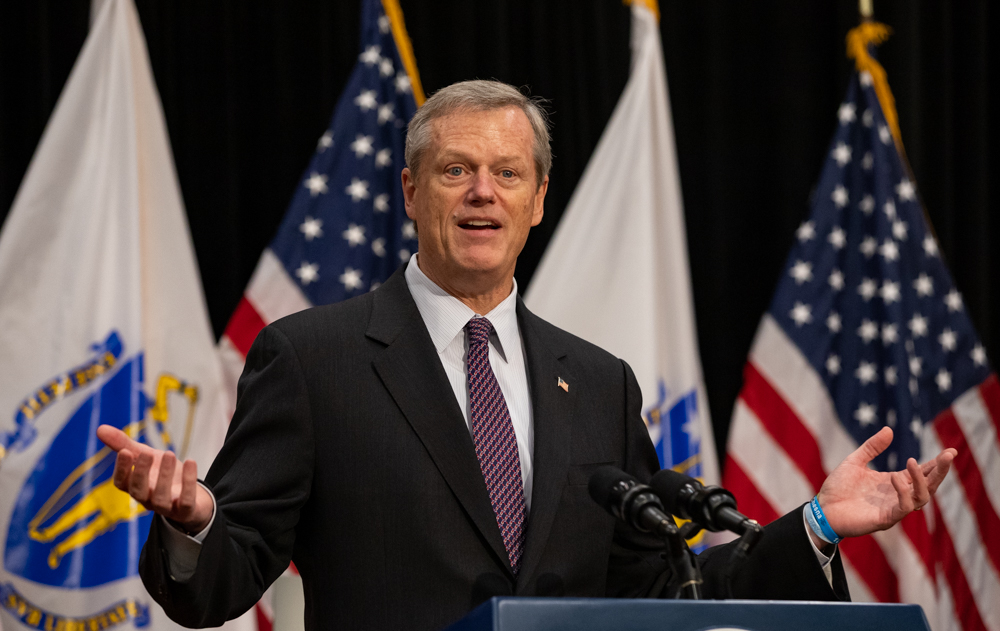latest
Governor Baker punctuates formal session’s end by signing clean energy bill

By Colin A. Young
AUG. 11, 2022…..Gov. Charlie Baker was able to overcome his agita and on Thursday signed the Legislature’s compromise offshore wind and climate policy bill, but he aired “deep misgivings” with some parts of the law and the way the House and Senate addressed his suggestions.
The new law seeks to reshape the way the state connects to offshore wind power, accelerate a transition to renewable energy sources and help Massachusetts achieve its target of net-zero emissions by 2050 — all general goals that Baker and his administration have long supported. However, the governor expressed concerns with the original bill the House and Senate sent him, and he returned it in late July with amendments, including a call to put $750 million in American Rescue Plan Act dollars toward clean energy uses.
While the Legislature did not adopt all of Baker’s suggestions when they reworked the bill in the final hours of formal lawmaking sessions, legislators did go along with some of the governor’s suggestions like the outright elimination of the offshore wind price cap.
In a letter to lawmakers Thursday, Baker recounted the “series of game-changing laws” that he and the Legislature have worked on together during his time in office and said that he was signing the new law “to ensure Massachusetts retains its standing as a national leader in securing renewable energy.”
“However, because the Legislature rejected virtually every meaningful amendment I put forth, this bill does not have the same shared sense of purpose that all previous climate legislation embodied, which is unfortunate,” he wrote. “We all know the Commonwealth faces significant challenges in dealing with two existential threats — climate change, and housing supply and affordability. This bill does not move Massachusetts in the right direction on housing. And the process by which many provisions in this bill are implemented will determine if this bill will make significant progress toward our climate goals.”
Massachusetts lawmakers, along with Baker and his administration, have committed the Bay State to reducing carbon emissions by at least 33 percent by 2025, at least 50 percent by 2030, at least 75 percent by 2040 and at least 85 percent by 2050, with tag-along policies required to get the state to net-zero emissions by the middle of the century. Getting electricity from renewable sources and switching things that run on fossil fuels to use that cleaner electricity is the state’s primary strategy for meeting those requirements.
The housing crisis has been a central part of Baker’s thinking around climate legislation since at least late 2020, when he vetoed an earlier version of what in early 2021 became the state’s climate roadmap law because it would have allowed municipalities to require new construction to be “net-zero” through updated building codes.
Earlier this week, he said a provision of the latest climate bill that would empower 10 municipalities — Acton, Aquinnah, Arlington, Brookline, Cambridge, Concord, Lexington, Lincoln, Newton and West Tisbury — to limit or ban the use of fossil fuels in new construction as part of a so-called demonstration project “gives me agita” and creates concerns about exclusionary zoning.
“It is unfortunate that the Legislature chose not to accept amendments I offered concerning housing production in communities that seek to implement a fossil fuel ban, because too many people in Massachusetts cannot afford to live here specifically because of the high cost of housing,” Baker wrote Thursday in his signing letter. He added, “And I implore the Legislature and the next Administration to take a good, hard look at what that 10-town policy concerning natural gas does to the cost and availability of housing that working people can afford before they consider offering this exclusionary zoning policy to other communities.”
Rep. Tommy Vitolo, an early supporter of the idea of prohibiting fossil fuel use in new construction who said the idea for Brookline’s fossil fuel ban bylaw was hatched on his front porch, said he doesn’t think the 10-town demonstration project is going to lead to higher costs for housing given the red-hot real estate markets and sky-high home sale prices in the 10 mostly well-to-do towns.
Vitolo gave an example of how he sees it playing out: a home goes up for sale and developers hurry to calculate what they can offer for the property while maximizing their profits. Competing against other developers in a market where prices are already through the roof, a builder would not add any extra cost of the fossil fuel-free construction to the new building’s sale price but would instead account for that extra cost in the amount they offer for the property, he suggested.
“If there is additional cost to comply with fossil fuel-free, that additional cost will come out of the land seller’s end of the deal, not out of the home buyer’s end of the deal,” Vitolo said.
Sen. Michael Barrett, who has co-chaired the Joint Committee on Telecommunications, Utilities and Energy for most of Baker’s time in office, said Thursday that it “has been a nail-biter” waiting to see what the governor would do with a bill that included sections he had already indicated he was no fan of.
“I believe the governor is really committed to the housing issue in the suburbs and wanted to figure out if there was a way to join climate and housing together. I am grateful to him that he isn’t holding one hostage to the other,” Barrett said. “The good news is that the state does have a working bipartisan consensus in favor of efforts to push back on climate change. How many other places can say that?”
In his signing letter, Baker pointed out that while he supports many thrusts of the law, the Legislature has not yet made available the money necessary to see it all become reality. Lawmakers opted to weave many of the funding mechanisms for the clean energy bill into a separate economic development bill, which Democrats tossed back onto the shelf at the eleventh hour amid some disagreement and confusion about how to handle tax relief provisions.
“The Legislature also chose not to enact the [economic development] bill, which lawmakers pledged to our Administration and the public during floor debate would provide the funding necessary to carry out the policies and programs needed for successful implementation of this legislation,” Baker wrote. He added, “The timing is urgent. Many elements of this legislation, hopefully combined with [economic development bill] funding, or some other state sourced resource, will place Massachusetts at an inflection point for a clean energy transition.”
And while the Legislature is unlikely to send Baker another significant piece of energy legislation now that it has concluded formal sessions for the year, Barrett said the funding issue is critical and means that the House and Senate’s work is not done yet.
“I don’t think the last chapter has been written in terms of clean energy in the Baker years,” he said. “We need to address this funding piece somehow.”
The news that Baker had signed the climate bill was met Thursday by relief and joy among environmental activists and those in the energy sector, like the non-profit solar advocacy organization Vote Solar.
“We are excited to join the Commonwealth in getting to work implementing the bill’s provisions to expand access to affordable rooftop solar and high-quality jobs in the renewable energy sector,” the group’s northeast regional director, Elena Weissmann, said. “The bill also preserves the health of our citizens and our neighborhoods by removing biomass from the renewable portfolio standard and strengthening the agency of our communities in engaging in infrastructure modernization projects that make possible a greener way of life.”






MortisMaximus
August 12, 2022 at 5:14 pm
RINO piece of shit!